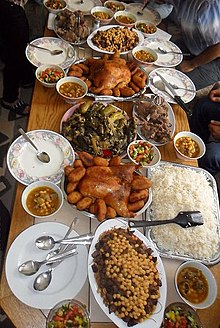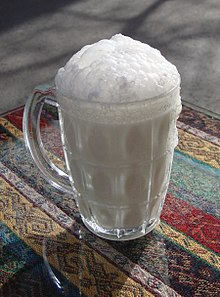Kurdish cuisine

The Kurdish cuisine includes various regional cooking styles and culinary specialties of the Kurds . It is based on an old tradition and is influenced by the neighboring cultures. From a geographical point of view, parts of Kurdistan are located in Anatolia and Mesopotamia . A lot of vegetables, meat and grains are cooked and eaten. Since many Kurds live from agriculture, dairy products such as cheese and yogurt are also staple foods.
Food

Breakfast usually consists of naan with yoghurt , various types of cheese or tahini with date or grape syrup . Breakfast eggs , cooked or as fried or scrambled eggs , are also popular. In addition, one usually drinks black tea or Ayran . Butter with honey is another popular component of breakfast. Traditionally, the main meal of the day is lunch, which is eaten between noon and 2 p.m. Dinner is usually hearty and warm. Changing work habits have resulted in many Kurds eating their main meal in the evening.
Rice and wheat
As a staple food, rice is one of most dishes in Kurdistan. Cooked bulgur is also eaten with side dishes such as meat or vegetables. Both bulgur and rice are often formed into balls and filled, especially with minced meat , almonds , herbs and other spices. A well-known example of this is the cube. This can be prepared with both rice and bulgur. The Kurdish variant of biryani is often prepared with Nouruz .
meat and fish
Lamb , beef and poultry are the main types of meat consumed in Kurdistan. Among the latter, chicken is the most common, goose , partridge, and turkey, and duck are also commonly eaten. Rabbit , deer and goat meat are also popular meats in Kurdish cuisine. Raw meat, as in German Mett or Tatar , is rather unpopular. Freshwater fish in particular and fish migrating into freshwater to spawn are also consumed, and marine fish in the marine regions on the Mediterranean Sea or the Persian Gulf. Many Kurds like to grill, different grilled dishes are chicken or minced meat skewers (kebabs) .
vegetables
Vegetables are often stuffed (e.g. stuffed peppers or stuffed aubergines), boiled, grilled and / or served as a side dish. Potatoes , peas , beans , aubergines , zucchini , tomatoes , green beans , cucumbers , olives , peppers or okra are the most common. Fried onions are often served on meat plates and are included in many dishes.
Spices and herbs
It is traditionally seasoned with salt, black pepper or curry . Every now and then also with, for the German palate rather exotic, pomegranate syrup (should not be confused with grenadine (food) ). In general, Kurdish cuisine has both spicy and non-spicy dishes - traditional herbs include parsley and dill, among others . Various types of ketchup have also been part of this kitchen since the 1950s.
Dairy products
Dairy products are widespread in the traditional ranching areas. In addition to different types of cheese, including cottage cheese , feta or sheep's cheese , there are different types of yoghurt or products similar to buttermilk such as Ayran (Kurdish: mastaw), which is often drunk with food.
Bakery products
In Kurdistan there are different types of bread , especially white bread and the naan made from leavened dough .
beverages
Freshly squeezed fruit juices are very popular in the hot months . An entire branch of industry in Kurdistan is based on this. Even black tea is drunk very much and to any occasion. Mastaw is also a popular drink that is mainly served with meals. Beer and other alcoholic beverages are widespread and consumed, but due to the alcohol ban in Islam , to which most Kurds belong, they do not have the same status as, for example, in Germany .
literature
- Hülya Baba: The traditional Kurdish cuisine. A cookbook. Photos by Christina Fischer, translated from Kurdish by Ilanit Doege and Hülya Baba, German and Kurdish, Edition Orient, Berlin 2011, ISBN 978-3-922825-11-1 .
- Ala Barzinji: Traditional Kurdish Food: An Insight into Kurdish Culinary Heritage . Troubador Publishing, Leicester 2015, ISBN 978-1-78462-414-9 .



